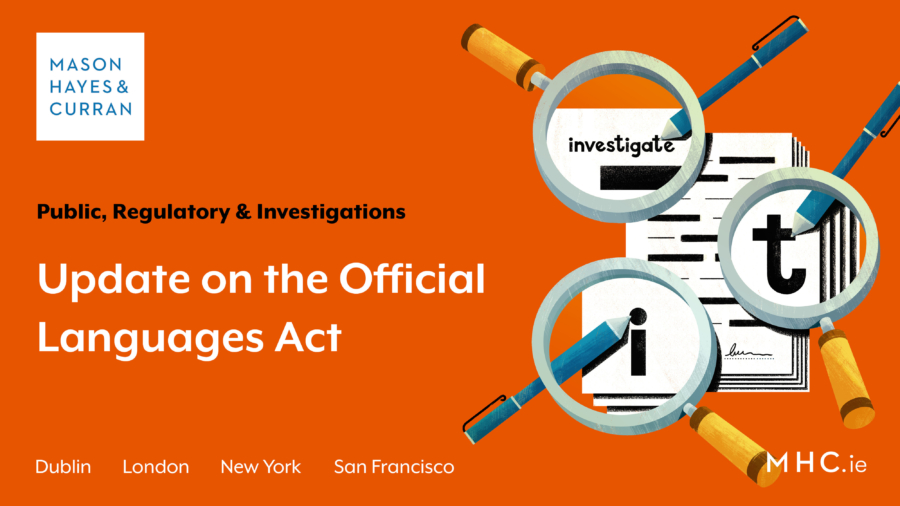Update on the Official Languages Act

The Official Languages (Amendment) Act 2021 (2021 Act) was enacted in December 2021, to introduce changes to the Official Languages Act 2003 (2003 Act).
The 2021 Act increases the obligations on public bodies to promote the use of the Irish language for official purposes. This will be done by increasing visibility of the Irish language in official forms, logos and media, and improving the provision of services by public bodies through Irish.
The majority of these new changes have yet to come into effect. When they do, they will represent the most significant overhaul of the Official Languages legislation to date. It is envisaged that this will take effect over a period of time. In accordance with the Act, this must not be not later than three years from the date of enactment.
We consider some of the key statutory obligations introduced by the 2021 Act, and the impact of these on public bodies.
The Official Languages legislation applies to:
- Government departments
- Government agencies
- Government boards
- State companies, and
- Local authorities
When the new changes introduced by the 2021 Act come into full effect, the increased obligations on these bodies will include the following key requirements:
Names, addresses and titles
The Minister for Community, Rural and Gaeltacht Affairs (Minister) will have the power to identify and prescribe public bodies and services that will have to ensure their information and communication systems can correctly record and use a person’s name, including the patronymic or matronymic form, address and title in Irish, including the “fada”.
Official forms
The Minister will also be able to identify public bodies and prescribe the contents and layout of their official forms, including any electronic form, to be in Irish, or in both Irish and English.
Logos
Where a public body alters, renews, or creates their logo, the 2021 Act will require that any text included in the logo must be in Irish or in both Irish and English. Importantly, the Irish text will have to appear before the English, and must not be any less “prominent, visible or legible”.
Advertising by Public Bodies
At least 20% of advertising by public bodies will have to be in the Irish language. 5% of the public body’s advertising budget must be used on advertising in the Irish language through “Irish language media.” This means any media where at least half of the content created will be through Irish.
Social Media
Where a person communicates through social media in Irish with a public body, the public body will be required to reply in Irish.
Staff Language Competency
One new change that has already come into effect is the establishment of an advisory committee to, among other things, prepare and submit a National Plan to the Minister for the provision of public services through Irish. One of the key objectives of the committee is increasing the number of staff in public bodies competent in Irish, so that by 31 December 2030, at least 20% of staff recruited are competent in Irish.
The 2021 Act also provides that within 3 months of the National Plan being submitted to the Government, the Minister shall specify the dates that Irish shall become the working language of the offices of any public bodies or class of public bodies in certain Gaeltacht areas and that all services provided by these public bodies shall be provided through Irish.
While it is unclear what the necessary language standards will be, or how this will be assessed, these changes are likely to have a substantial effect on recruitment into the public sector
Conclusion
The Official Languages (Amendment) Act 2021 is the most significant overhaul of the Official Languages legislation to date. Once its provisions take full effect, the legislation will place an increased onus on relevant public bodies to highlight and facilitate the use of the Irish language. This will be achieved by setting statutory obligations and objectives for public bodies to increase marketing and advertising through Irish, the provision of public services through Irish and the competency of staff in Irish to provide these services. Public bodies need to consider if, how and when these increased obligations will apply to their organisations, so they can prepare and manage budgets to ensure compliance.
For more information on the commencement of the legislation, please get in touch with a member of our Public, Regulatory & Investigations team.
The content of this article is provided for information purposes only and does not constitute legal or other advice.
Share this:



